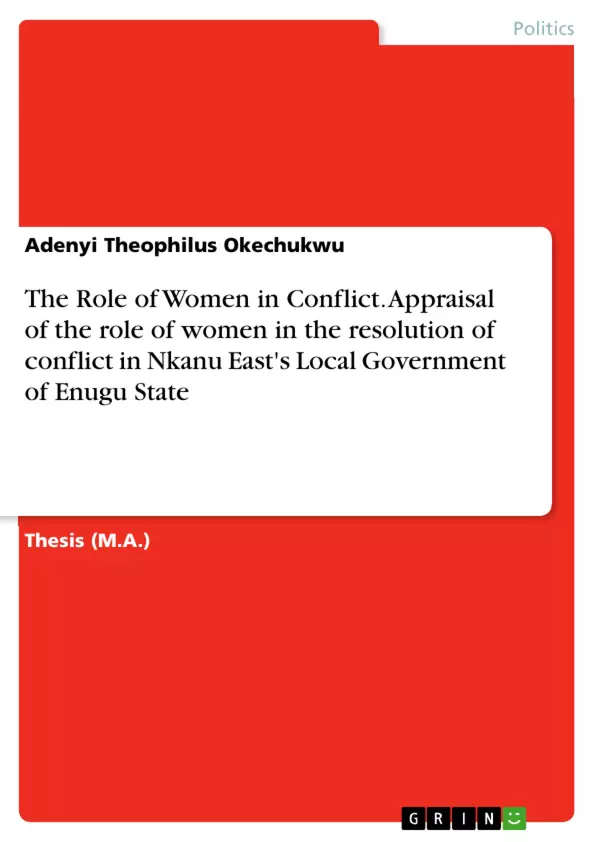This study appraised the role of women in the resolution of conflict in Nkanu East Local Government Area of Enugu State of Nigeria. The rational for this study is to verify whether the women of the study area participates in conflict resolution, the strategies and the cultural barriers, if any, that militates against their participation in conflict resolution and peace process in the area as well to identifying whether they are fully integrated in the decision making processes and institutions in the area.
Data used in this work are from primary sources. Survey method of quantitative research was used during the study; Questionnaire/Oral Interview was used to collect data from the population of study while probability sampling method was also used to represent the population of Study. The work finds that the women of the study area participating in conflict resolution through the institutions of Umuada, Extended Family Wives Association, Christian Mothers Union and Community Women Association and that they make use of strategies such as mediation, arbitration, good office conciliation, and traditional methods like oath taking, marriage, covenant and ritual among others. Also there are some cultural barriers militating against them in this regards.
The work also finds that women of the area are marginalized in both elective and appointive positions and thus underrepresented in the decision making organs and institutions for peace in the Local Government and beyond including the communities in the area etc. The work thereafter recommends among others that all the cultural barriers that forbid women’s inclusion or membership of decision making institutions for peace in the area and beyond should be removed, women’s marginalization as well as lack of gender mainstreaming in the area should be addressed in the spirit of the United Nation Security Council Resolution 1325 of 2000.
Inhaltsverzeichnis (Table of Contents)
- Chapter One: Introduction
- 1.1 Background of the study
- 1.2 Statement of the Problem
- 1.3 Research Questions
- 1.4 Objective/ Purpose of the Study
- 1.5 Hypothesis
- 1.6 Significance of the Study
- 1.7 Scope of the Study
- 1.8 Definition of terms
- Chapter Two: Literature Review
- 2.1 Introduction
- 2.2 Conceptual Framework
- 2.2.1 Concept of Conflict
- 2.2.2 Concept of Conflict Resolution
- 2.2.3 Concept of Gender equality
- 2.2.4 Concept of Peacebuilding
- 2.2.5 The role of Women in Peacebuilding
- 2.2.6 The Traditional Roles of African Women in peace Making and Peace Building
- 2.2.7 Te Role of African Women in Peace Building and Conflict Resolution: The Case of Burundi
- 2.2 Theoretical Framework
- 2.3 Summary
- Chapter Three: Methodology
- 3.1 Area of Study
- 3.2 Research design
- 3.3 Sources of Data
- 3.4 Method of Data Collection
- 3.5 Sampling Techniques
- 3.6 Instrumentation
- 3.7 Method of Data Analysis
- Chapter Four: Data Presentation, Analysis and Discussion
- 4.1 Data Presentation
- 4.1.1 Demographic Distribution of the Respondents/Interviewee
- 4.1.2 Analysis of Responses from Research Question
- 4.2 Findings of the Study
- 4.3 Discussion on the findings
Zielsetzung und Themenschwerpunkte (Objectives and Key Themes)
This study aims to assess the role of women in conflict resolution in Nkanu East Local Government Area of Enugu State, Nigeria. It seeks to understand whether women participate in conflict resolution, the strategies they employ, and the cultural barriers that may hinder their involvement. The study also explores whether women are fully integrated into decision-making processes and institutions in the area.
- The participation of women in conflict resolution
- Strategies employed by women in conflict resolution
- Cultural barriers hindering women's participation
- Women's representation in decision-making bodies
- The impact of women's involvement on peacebuilding
Zusammenfassung der Kapitel (Chapter Summaries)
Chapter One introduces the background of the study, outlining the significance of women's role in conflict resolution and peacebuilding. It also sets out the research problem, questions, objectives, hypothesis, scope, and definition of terms. Chapter Two provides a comprehensive literature review, exploring the concepts of conflict, conflict resolution, gender equality, peacebuilding, and the role of women in these processes. Chapter Three details the methodology employed in the study, including the area of study, research design, data sources, data collection methods, sampling techniques, instrumentation, and data analysis methods.
Schlüsselwörter (Keywords)
The study focuses on key concepts such as conflict, gender equality, conflict prevention, conflict resolution, peacemaking, peacebuilding, and reconciliation. It examines the role of women in these processes, particularly within the context of Nkanu East Local Government Area of Enugu State, Nigeria.
- Citation du texte
- Adenyi Theophilus Okechukwu (Auteur), 2015, The Role of Women in Conflict. Appraisal of the role of women in the resolution of conflict in Nkanu East's Local Government of Enugu State, Munich, GRIN Verlag, https://www.grin.com/document/338735



